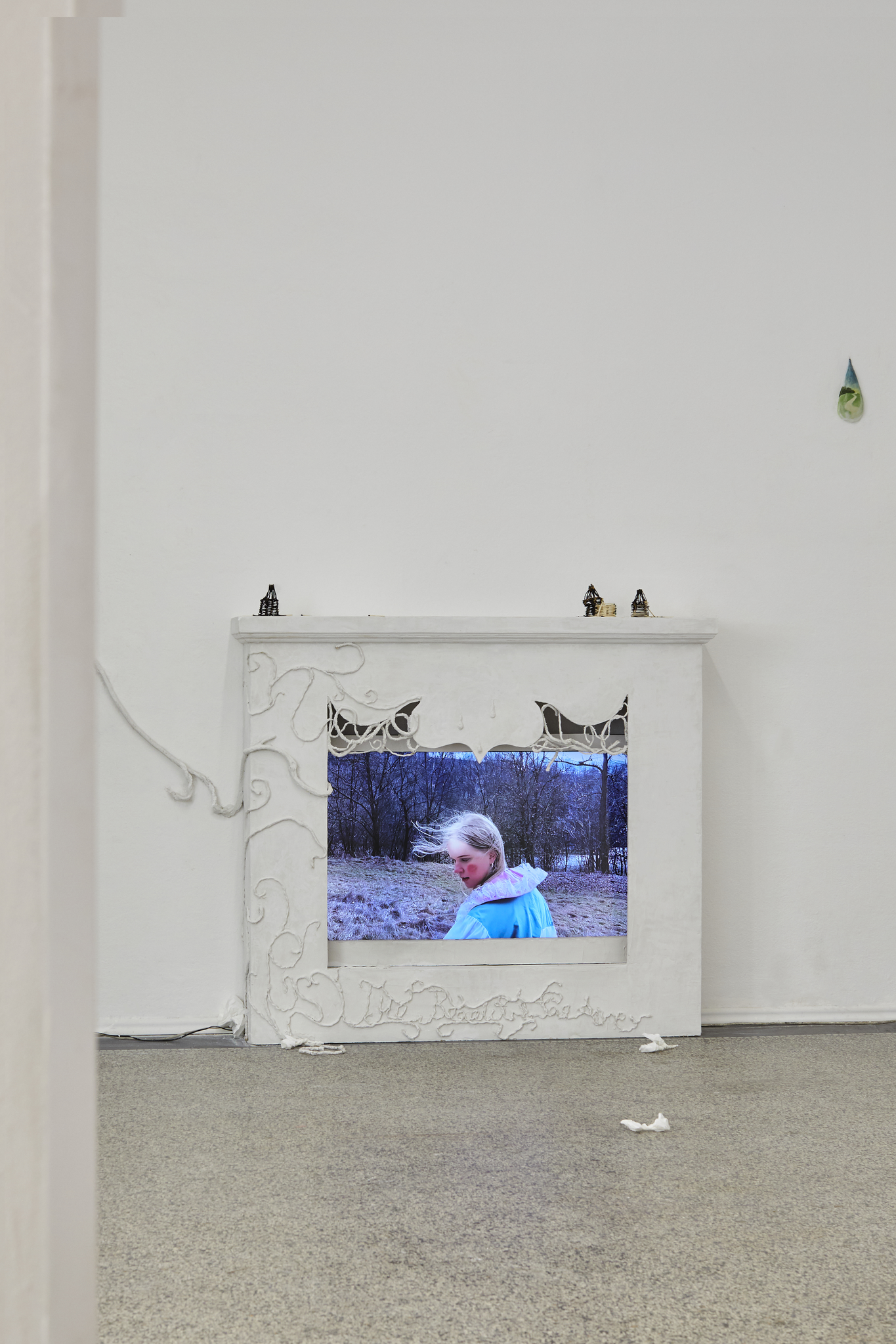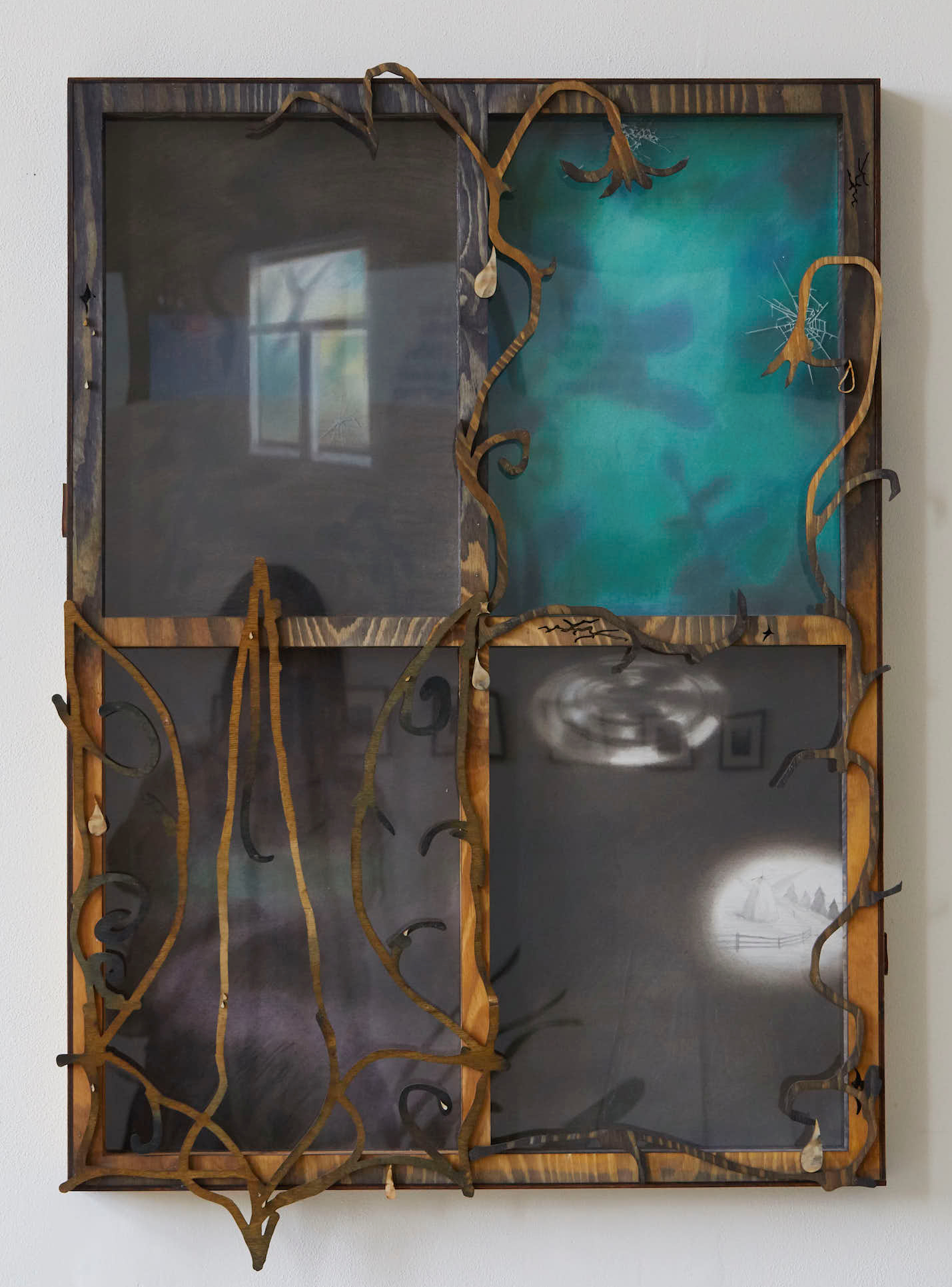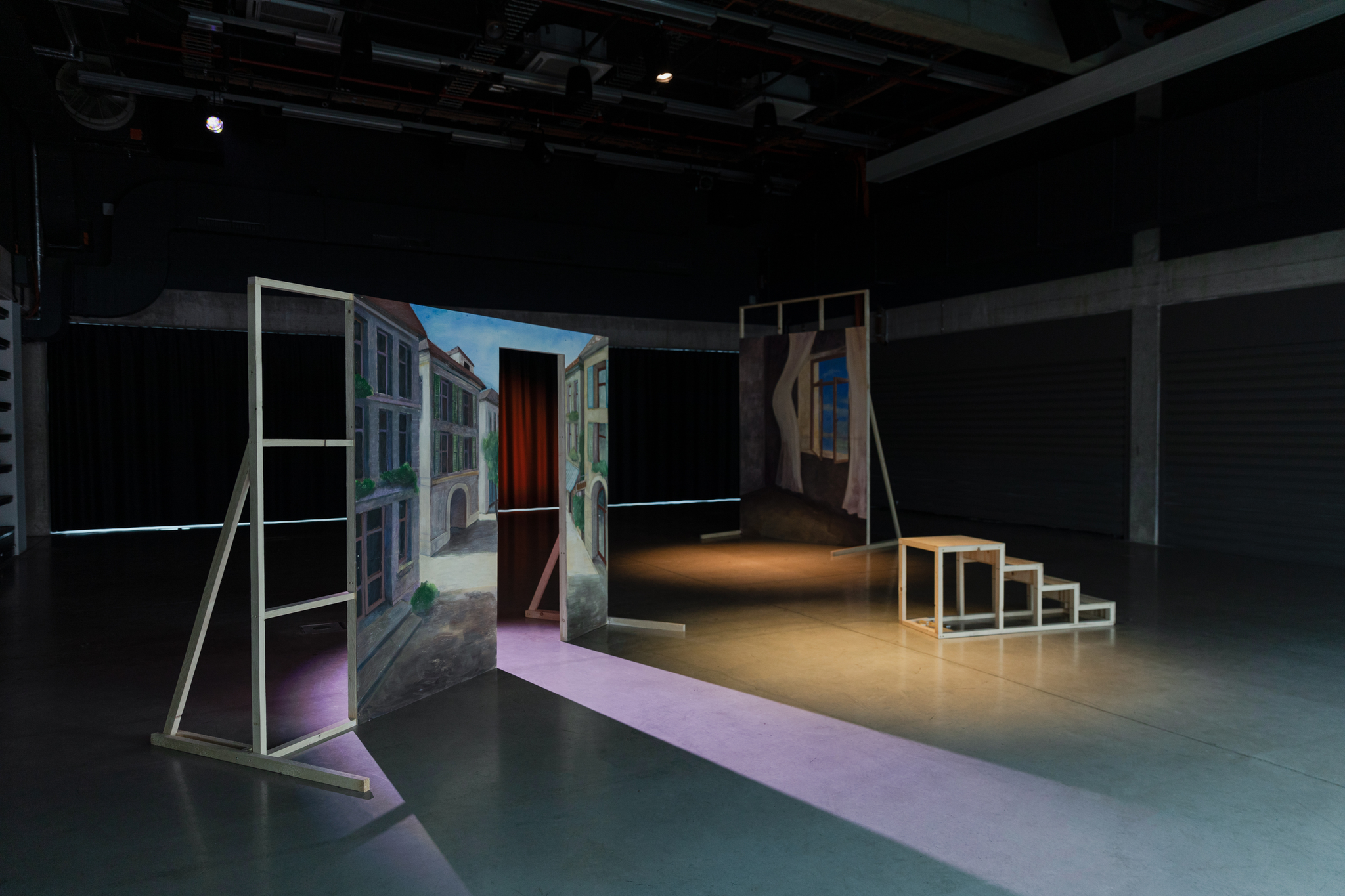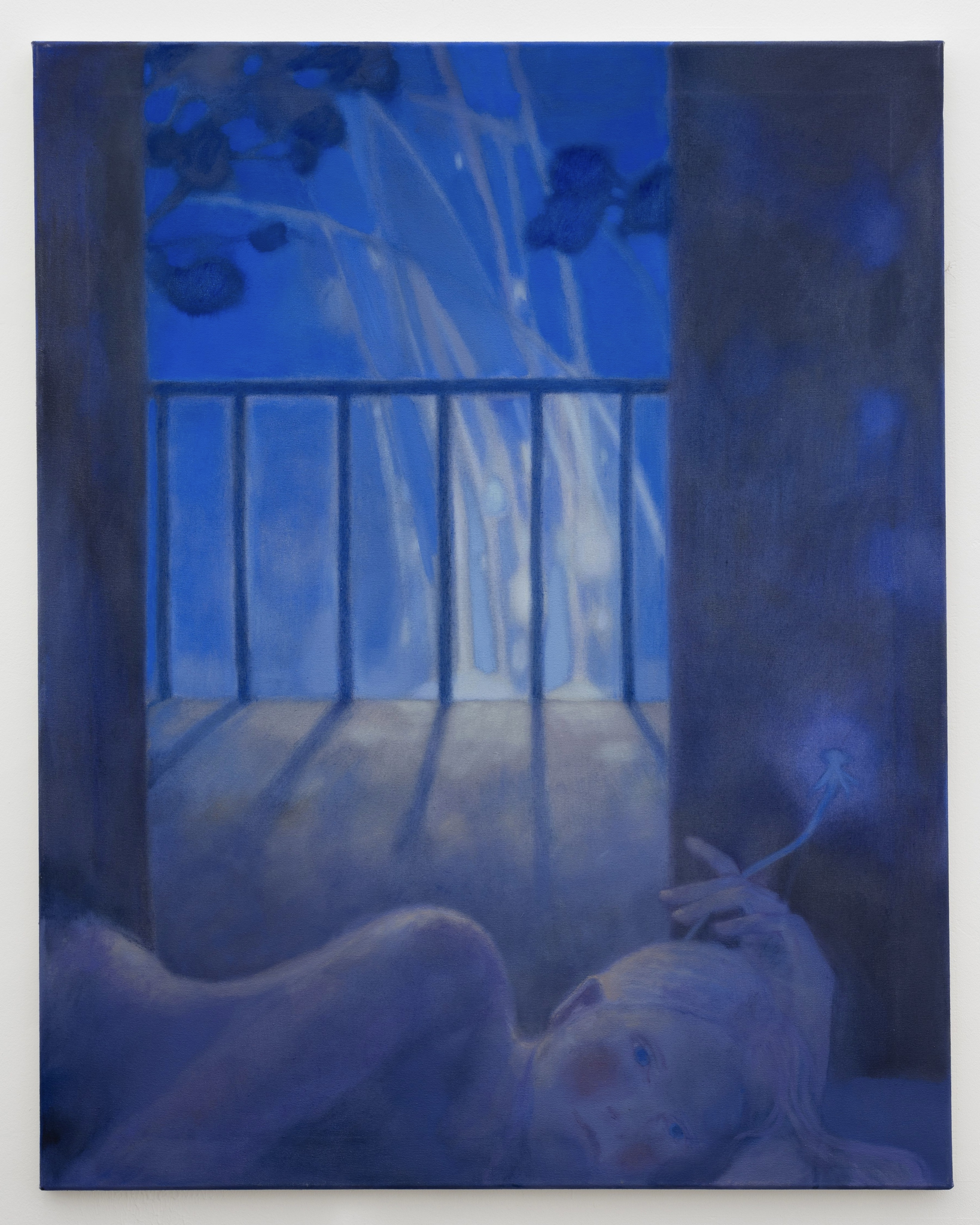Masha Kovtun / Маша Ковтун was born in 1993 in Dnipropetrovsk in the eastern part of Ukraine (as a result of decommunization and desovietization of Ukraine, the city was renamed Dnipro in 2016.) Between 2010 and 2015 she studied a bachelor’s degree in architecture at PGASA in Dnipro (Prydniprovska State Academy of Civil Engineering and Architecture / Придніпровська державна академія будівництва та архітектури). In 2015, after the Russian annexation of Crimea and Donetsk and Luhansk, she decided to leave to study in the Czech Republic. In 2017–2024, she studied at UMPRUM (Academy of Arts, Architecture and Design in Prague) in several studios of fine arts. She completed a bachelor’s degree in painting at Jiří Černický and Michal Novotný’s painting studio and obtained her master’s degree in the Studio of Fine Arts III headed by Michal Pěchouček and Dominik Gajarský. She also completed an internship at Die Angewandte in Vienna (Universität für angewandte Kunst, Henning Bohl painting studio).
Masha Kovtun’s multimedia installations combine paintings, videos, sculptures and performance. Her works involve a recurring theme of looking for one’s own identity, nostalgia and uprootedness, determined by the specific situation of an immigrant that has been living in Prague for a long time. Her work relates to the theme of home in its broadest sense, as a loss of intimacy and security in the world based on the endless flow of a present becoming rapidly obsolete.
LADA HUBATOVÁ-VACKOVÁ’S INTERVIEW WITH MASHA KOVTUN, CONDUCTED VIA EMAIL, JULY 2024
Lada Hubatová-Vacková: Where exactly are you from? What is happening in your hometown right now? Is your family with you in Prague? Under what circumstances did you come to Prague and why did you choose UMPRUM?
Masha Kovtun: I come from Dnipro. Right now, my hometown is unfortunately being attacked by Russia every day. My parents moved to Czechia around six months after the beginning of the full-scale Russian invasion, in 2022. They both lost their jobs then because of the war.
I moved to Prague a year after the war broke out in the east of Ukraine. In 2015. Even then, tanks were passing through Dnipro on their way to Donetsk and Luhansk. That was the main reason my sister and I had to leave home. Our parents had to sell the house they built, the one in which I grew up, to be able to support our lives in Europe. They had to move into a rental afterwards. Perhaps that is why home is still among the central themes of my work.
I had heard that UMPRUM is a good school where I could apply to study fine arts. Studying contemporary art has been my dream while studying architecture in Ukraine.
LHV: How do you feel about Prague and the Czech Republic? Do you feel good here? Have you encountered any issues?
MK: Every time a trip abroad ends, I look forward to coming back to Prague. I think that’s the feeling one gets when they perceive the city or country as their home. After ten years of living in Czechia, I definitely see Prague as my second home. But that wasn’t always the case. The first two years or so of living here were difficult. I have experienced a lot of xenophobia, at the Foreign Police, on public transport, at work. Over time, you stop paying attention to it, particularly if you’re surrounded by great people that are always happy to support you. However, since the start of the full-scale Russian invasion, I have begun to notice again that some Czechs treat Ukrainians badly. For example, once there was this woman on a bus who punched me and yelled that I should go back home. Just because I had a small Ukrainian flag on my backpack.
LHV: How did you feel at UMPRUM and at the Studio of Fine Arts III headed by Michal Pěchouček and Dominik Gajarský? Why did you choose this studio specifically?
MK: The years I have spent at UMPRUM are definitely one of the best times in my life, during which I met great people. It was a period of intense collaboration and friendships that will hopefully last for the rest of my life.
Originally, I was at the painting studio led by Jiří Černický and Michal Novotný, but I didn’t stay long. I think that one of the best things that our school offers is the opportunity to try term-long internships in other studios during the studies, no matter what program you study. I decided to make full use of this opportunity and eventually I studied in almost every studio of fine arts. I transferred to FA III headed by great professors, Michal Pěchouček and Dominik Gajarský. The approach at FA III was most engaging and friendly. The collective felt like a family to me.
LHV: Describe what you deal with in your artistic work, what are your thoughts in this context, what kind of approaches you employ in your projects. Feel free to elaborate.
MK: The themes I deal with in my work are home, nostalgia and the search for one’s own identity. Nostalgia is mostly manifested as longing for security, as something that has never been and probably never will be achieved. Security can be embodied by home, personal space or a native country – a motif that must be considered not only in the context of my immigrant experience, but also metaphorically as a loss of intimacy and security because of living in a world that is constantly accelerating.
Although I had the opportunity to explore different media and experiment with various techniques during my studies at UMPRUM, painting has always been the closest medium, the one that I have been building on. I often prefer to present my work via installations. This gives me the opportunity to create different scenes by combining painting with video, objects and environment. I like working with the space and I create certain props for my paintings, that allow the viewer to find the continuation of the story.
For my diploma thesis at UMPRUM, I tried performative art for the first time, focusing on the metaphorical concept of євроремонт (“European rebuilding”) and emphasizing how the concept of Europe is fixed and reflected in the interior spaces in Ukraine and how it coexists with ideologically charged material dimensions of a postsocialist state. I’m building on my long-standing interest in exploring Ukrainian wall paintings depicting views of European cities and are a frequent interior feature of many apartments in Ukraine. I link this cultural phenomenon that posits Western Europe as a promise and a dreamy “vision” with specific geopolitical events related to current migration and growing political instability.
With the beginning of the full-scale Russian invasion of Ukraine and after nine years of living “there”, beyond the borders of “European backdrops”, the theme of home has acquired a different context, in which I have begun to consider decolonial approaches in my work. That is why I explore the phenomenon of the European Dream as a means of escape from the past of Soviet colonialism and current Russian imperialism in my diploma thesis at UMPRUM.
LHV: Do you feel you need to become socially and politically engaged in connection with Ukraine? If so, in what form?
MK: I became interested in politics during Euromaidan in 2013. This event was my first participation in a demonstration, during which I witnessed policemen breaking my friends’ arms. Euromaidan represented a setting that does not only refer to geopolitical values, but also to a struggle for freedom from the Russian occupation that came a year later. I think that everyone in my age started to be socially and politically engaged. I was only 19 years old, and I felt that the future was only in our hands. In general, I think that any sense of oppression and injustice strengthens social and political engagement.
In the first week after the beginning of the full-scale Russian invasion, me, fellow artist Olga Krykun, Barbora Švehláková and Lucie Rosenfeldová organized several “Art for Ukraine” events in INI space and we raised about CZK 360,000 for aid in Ukraine. Over the past two years, I have also been working on various projects to support Ukrainian children, both in Czechia and in Ukraine.
My main outlet for engagement are social networks. They give me the opportunity to inform my European followers about the current war events and Russian crimes in Ukraine.






